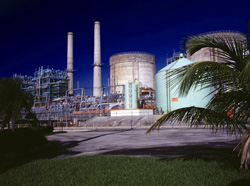 The Turkey Point nuclear power station, just 25 miles south of Miami, Florida, was granted its second license renewal (Unit 3 from 2032 to 2052 and Unit 4 from 2033 to 2053) by an Atomic Safety License Board of the U.S. Nuclear Regulatory Commission (NRC) to operate the two Westinghouse units beyond 60 to 80 years. Public interest intervenors in the case have appealed the board’s decision to the Commissioners and are awaiting a decision, but federal court action is deemed likely necessary. The licensing board dismissed all of the environmental contentions jointly submitted by the Natural Resources Defense Council, Friends of the Earth and Miami Riverkeeper and separately by the Southern Alliance for Clean Energy. The groups’ contentions focused on Florida Power & Light’s (FPL) failure to adequately consider cooling towers as the less harmful alternative to the Turkey Point’s current expansive cooling water canal system and its adverse impacts on groundwater, the Biscayne Bay and federally protected species.
The Turkey Point nuclear power station, just 25 miles south of Miami, Florida, was granted its second license renewal (Unit 3 from 2032 to 2052 and Unit 4 from 2033 to 2053) by an Atomic Safety License Board of the U.S. Nuclear Regulatory Commission (NRC) to operate the two Westinghouse units beyond 60 to 80 years. Public interest intervenors in the case have appealed the board’s decision to the Commissioners and are awaiting a decision, but federal court action is deemed likely necessary. The licensing board dismissed all of the environmental contentions jointly submitted by the Natural Resources Defense Council, Friends of the Earth and Miami Riverkeeper and separately by the Southern Alliance for Clean Energy. The groups’ contentions focused on Florida Power & Light’s (FPL) failure to adequately consider cooling towers as the less harmful alternative to the Turkey Point’s current expansive cooling water canal system and its adverse impacts on groundwater, the Biscayne Bay and federally protected species.
The intervenors also opposed the “subsequent license renewal” (a total of 60- to 80-years) because NRC and FP&L failed to take the necessary “hard look” under the National Environmental Policy Act (NEPA) to scrutinize an accelerating climate crisis, rising sea levels and extreme weather events and the impacts on the coastal reactors’ safety systems, structures and components. In fact, NRC and FP&L are attempting a blatant end run around a performing a NEPA analyses open to independent discovery and cross-examination of the climate emergency for the license extension period. This is the point of using a Generic Environmental Impact Statement (GEIS). NRC argues that “Category 1” issues in the GEIS have already been generically addressed by the all nuclear power stations. Generically qualified Category 1 issues are outside the scope of the site specific public hearing process unless the petitioners can demonstrate new and significant information since the GEIS was written for Turkey Point.
According to the published NRC GEIS, “…the effects of climate change on Turkey Point Units 3 and 4 structures, systems, and components, as a safety consideration, are outside the scope of the NRC staff's license renewal environmental review.” By their analysis, “Site-specific environmental conditions are considered when siting nuclear power plants," fifty years ago.
In fact, according to the Natural Resource Defense Council, “Most of the Turkey Point site is constructed within the coastal flood zone, as designated by the Federal Emergency Management Agency (i.e., floods with a 1-percent chance of occurring in any single year).” NRDC further asserts that the NRC is relicensing the plant on a fifty-year old understanding of climate perturbation that no longer exists, “let alone during the proposed subsequent license renewal period ending in 2053.” The intervenors argue that “NRC cannot meet its obligations under NEPA to take a ‘hard look’ at the environmental consequences of its proposed further extension of the license using outdated assumptions of a stable climate made half a century ago,” that is now devoid of the most recent science.
The NRC staff counters that, “Contrary to the commenter’s statements, the NRC staff considered the effects of climate change and associated impacts on the environment and discusses the observed changes in climate change indicators, including sea level rise, flooding, storms, and the potential future climate change effects during the subsequent license renewal term based on climate model simulations under future global greenhouse gas emission scenarios.”
Just what is the NRC's confidence level in these “climate model simulations” twenty, thirty years into the future? It’s obviously in doubt given that climate scientist still constantly updated models otherwise underperforming reality. At present, the NRC “Probable Maximum Storm Surge (PMSS) estimate” projected for the Turkey Point site was 24.8 ft (7.6 m).
The NRC GEIS for Turkey Point goes on to assure that “On an ongoing basis, this oversight assesses the adequacy of structures, systems, and components of a nuclear power plant, including their exposure to hazards such as flooding. The NRC’s reactor oversight program will continue in effect throughout the period of subsequent license renewal.”
The NRC would like the public to have confidence in the agency that “operating plants’ structures, systems, and components are continually evaluated for external hazards under the NRC’s Reactor Oversight Process where emerging safety and security issues are addressed.” In fact, even the faithful in Congress are having their doubts that Commission places public safety margins above industry profit margins. Watch US Senator Sheldon White House (D/RI) grill the Commissioners on coastal reactors, the climate emergency and failing flood protection in an April 2, 2019 Senate Environment and Public Works hearing. > https://www.youtube.com/watch?time_continue=742&v=gNUxATpYJX8 < @ time mark 13:19 for Senator Whitehouse)
As we see it, the level to which the NRC oversight process and its streamlined license extension process will stoop to accomodate industry, the agency has lost credibility as aging reactors become more dangerous and the climate crisis worsens.